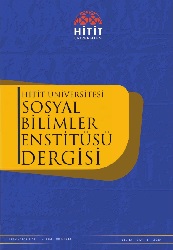1923-1929 döneminde Türkiye’de uygulanan vergi politikalarının mali sosyoloji çerçevesinde değerlendirilmesi
Evaluation of Tax Policies Applied in Turkey in the Period of 1923-1929 in the Framework of Fiscal Sociology
Author(s): Rana Dayioğlu ErulSubject(s): National Economy, Economic history, Political history, Economic policy, Political economy, Interwar Period (1920 - 1939), Fiscal Politics / Budgeting
Published by: Hitit Üniversitesi Sosyal Bilimler Enstitüsü
Keywords: Fiscal Sociology; The Theories of Fiscal Sociology; Tax Policies of 1923-1929 Period; Tax Policies of Republic Period;
Summary/Abstract: Fiscal sociology deals with the study of fiscal events from a sociological perspective and investigates both the impact of fiscal events on society and the effects of the factors affecting and forming the structure of society on fiscal events. Fiscal sociology examines fiscal events by considering historical, cultural, social, legal and political factors in addition to its economic aspects. In this regard, the policies that are put into practice by making the researches of fiscal sociology are more easily adopted by the society and can achieve success as they reflect the structure of the society. Sociological view of fiscal events is important in this respect. The aim of the study is to evaluate the tax policies of the 1923-1929 period within the social and economic conditions of the period and to investigate whether the fiscal sociology approaches are effective in the implementation of tax policies. For this purpose, tax policies of the period have been tried to be evaluated on the basis of fiscal sociology theories and even though it is tried to be made arrangements considering the social structure in the period, the desired purpose could not be achieved due to the financial and economic conditions of the period.
Journal: Hitit Üniversitesi Sosyal Bilimler Enstitüsü Dergisi
- Issue Year: 13/2020
- Issue No: 1
- Page Range: 1-21
- Page Count: 21
- Language: Turkish

